Textual Variants Collection (47 vols.)
Digital Logos Edition
For an updated version of this collection, see here.
Please note: This product does not contain the Online Manuscripts feature from Logos 6. To get the complete Textual Variants tooling for your software, you’ll need to upgrade to Logos 6 Gold or higher.
Overview
Preserved by hundreds of ancient manuscripts spanning a dozen ancient languages and ancient Christian cultures, the Bible has a complex history of transmission, transcription, and translation. Omitted verses in ancient or modern translations (such as Mark 16:9–20 and John 7:53–8:11) leaves many Christians wondering about the reliability of modern Bible translations or the canonicity of Scripture. With the Textual Variants Collection, studying the transmission of each and every verse of the Bible becomes much, much easier. With your Logos Bible Software Textual Variants feature, you’ll be able to see how each verse was preserved and translated throughout the centuries, whether through Egypt in the Coptic tradition or by Rome in the Latin translations.
Become equipped to explain the history of Bible transmission and preservation, and gain insights to the treatment of the Bible text in early Jewish and Christian cultures. The Textual Variants Collection pulls the original-language texts from numerous commentaries and codices, allowing users to view overviews and commentary on missing or extraneous passages, and compare primary texts with modern translations.
Curious how these resources work in Logos Bible Software? Watch the video below to see for yourself where you’ll be using them:
- Contains Logos resources with extensive specialized Textual Variant tagging
- Covers both Old and New Testaments and the apocrypha
- Spans dozens of ancient manuscripts and texts that cite variant editions
- Title: Textual Variants Collection
- Volumes: 48
- Resource Types: Ancient Texts, Ancient Manuscripts
- Languages: Greek, Latin, Hebrew, Syriac, Coptic, and Aramaic
- Topic: Textual Criticism
- Software Requirements: Logos 6 Gold, Logos 6 Feature Crossgrade, or higher
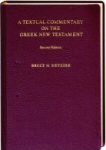
A Textual Commentary on the Greek New Testament
- Authors: Bruce M. Metzger
- Publisher: United Bible Societies
- Publication Date: 1994
This work is a companion volume to the fourth edition of the United Bible Societies' Greek New Testament (UBS4), published by the German Bible Society on behalf of the United Bible Societies early in 1993. It also makes a great companion to the German Bible Society Bundle, which contains the critical apparatus of the NA27 Novum Testamentum Graece, and to Comfort & Barrett's Text of the Earliest New Testament Greek Manuscripts.
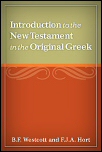
Introduction to the New Testament in the Original Greek: Appendix Only
- Authors: B. F. Westcott and F. J. A. Hort
- Publisher: Harper & Brothers
- Publication Date: 1882
Westcott and Hort’s Introduction is one of the most important, ground-breaking books in New Testament Studies. This resource contains only the appendix, which contains the second portion of the volume, including Notes on Select Readings—in essence, a critical apparatus or textual commentary on important New Testament passages. There are also appendixes for Old Testament quotations and orthographical notes. The full version of Introduction to the New Testament in the Original Greek is also available individually.

Byzantine/Majority Textform Greek 2.0
- Authors: William G. Pierpont and Maurice A. Robinson
- Publisher: The Original Word Publishers
- Publication Date: 1995
The Byzantine Majority Greek text represents the texttype reflected among the vast majority of extant manuscripts. It is from this family of Byzantine texts that the early printed Greek New Testaments ("Textus Receptus" editions) and early English versions such as the Bishop's, Geneva, Coverdale, and King James Version derive, as well as the early European versions such as that of Luther and the Dutch Staten Vertaling.
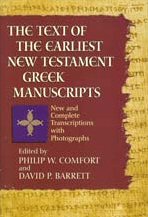
The Text of the Earliest New Testament Greek Manuscripts
- Editors: Philip W. Comfort and David P. Barrett
- Publisher: Tyndale
- Publication Date: 2001
Containing transcriptions of the 69 earliest New Testament manuscripts ever discovered, this book provides a representative sample of the New Testament that was read by Christians in the earliest centuries of the church. These manuscripts were the “Bible” they read and revered; to them, these manuscripts were the New Testament text.
Superb documentation. Painstaking accuracy. That’s what makes this work an invaluable reference for serious Bible students. Intended for scholars and students who are interested in the original text of the Greek New Testament. This is an accessible and accurate collection, invaluable in determining the original text of the New Testament.
This volume provides all manuscripts as their own separate resource, allowing you to separate them into personal collections and treat each manuscript as its own document.

Westcott-Hort Greek New Testament
- Editors: Brooke Foss Westcott and Fenton J.A. Hort
- Publication Date: 1881
According to Bruce M. Metzger, this edition was "the most noteworthy critical edition of the Greek Testament ever produced by British scholarship." They presented what is doubtless the oldest and purest text that could be attained with the means of information available in their day. They took the critical methodology which was then in nascent form, refined it, and applied it to the various texts, producing the classification system which is still in use today; their evaluation of the various texts and text families, almost unchanged, is still accepted. This text, published in 1881, is the first modern critical text and as such the ancestor of the NA/UBS text. It is of use to those interested in the history of textual scholarship and to those who do serious critical work.
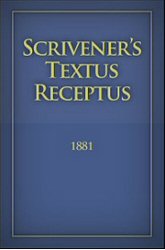
Scrivener’s Textus Receptus 2.0 (SCR-TR)
- Editors: F.H.A. Scrivener and Kirk DiVietro
- Publication Date: 1881
The Textus Receptus 1881 Greek text is the corresponding Greek text to the 1611 King James Version. The Scrivener text is a modified Beza 1598 Textus Receptus in which changes have been made to reflect the readings chosen by the KJV translators. Scrivener's intent was to artificially create a Greek text that closely matched the translator-modified Textus Receptus text and the resulting English version. This is a useful text for comparison for those with proficiency in Greek.
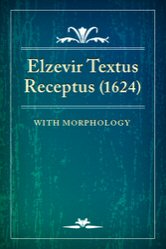
Elzevir Textus Receptus (1624) with Morphology (TR)
- Editors: Maurice A. Robinson
- Publication Date: 1624
The Stephens 1550 Textus Receptus adjusted to reflect the text of Elzevir 1624. Prepared by Dr. Maurice Robinson from the collation data in Scrivener’s Plain Introduction (1st ed. 1861), 304–310; and Hoskier’s A Full Collation of Ev. 604, Appendix B, 1–14. Morphological information originated with Dr. Maurice Robinson’s editions of the Stephen’s Textus Receptus (1550) with Morphology and Scrivener’s Textus Receptus (1894) with Morphology.
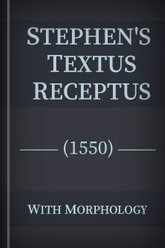
Stephen’s Textus Receptus (1550) with Morphology (STV-TR)
- Editors: Robertus Stephanus and Maurice A. Robinson
- Publication Date: 1550
The Stephens 1550 Textus Receptus edition, with complete parsing information for all Greek words, as printed in the George Ricker Berry Interlinear Greek NT volume. Morphological analysis provided by Dr. Maurice A. Robinson. The Textus Receptus 1550 Greek text is best known as the basis for the King James Version or Authorized Version completed in the year 1611. This is a useful text for comparison for those with proficiency in Greek.
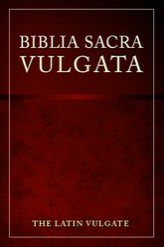
Biblia Sacra Vulgata, the Latin Vulgate (VUL)
- Publisher: Deutsche Bibelgesellschaft
- Publication Date: 1969
Jerome’s translation of the Greek and Hebrew Scriptures into the vulgar (common) tongue of his time: Latin. It was recognized as authoritative during the Council of Trent (1546) and became the official Bible of the Roman Catholic Church. The widespread use of the Vulgate is also recognizable in its influence in early modern Bible translations, such as the Authorized, or King James, Version. Since Jerome lived in the fourth century AD, the original text "developed" much as the Greek autographs did, with geographical variant readings, etc., and the modern edition is a critical text from these variant manuscripts, much as is the case with modern Greek texts. The Vulgate continues to be of scholarly use today in the study of the textual transmission of the Bible and in the historical study of Christian theology.
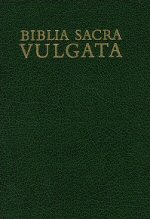
Biblia Sacra Vulgata: Psalmi iuxta Hebraicum et Varia Lectio (SESB)
- Editor: Robert Weber and Roger Gryson
- Publisher: Deutsche Bibelgesellschaft
- Publication Date: 1969
This resource contains the book of Psalms translated from the Hebrew, as well as a variant reading of IV Esdras 15:59–16:32. Both texts have been included along with this edition of the Vulgate for the purpose of comparison. In the electronic edition these texts have been created as an independent resource in order to use the comparison tools of Logos Bible Software. This volume only contains the variant reading and the Psalm translation, and does not contain the apparatus originally included with the print edition of the Vulgate—for the full edition, be sure to check out Vulgate with Apparatus.

Sahidica: The New Testament According to the Egyptian Greek Text
- Author: J. Warren Wells
- Publisher: Logos Research Systems, Inc.
- Publication Date: 2006
Sahidica: The New Testament According to the Egyptian Greek Text is a Greek version of the NT based on the CCAT lemmatized version of the United Bible Societies’ text. Its purpose is to provide a parallel Greek text from the Egyptian sources that most likely acted as the basis for the Sahidic version. Featuring uncial, all capitalized text, this simplified edition has been altered to correspond to the Sahidic only where there is support in the UBS apparatus. The simplification allows the student or researcher to better compare differences between the Sahidic and the standard Greek texts.
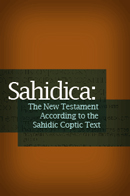
Sahidica: The New Testament According to the Sahidic Coptic Text
- Author: J. Warren Wells
- Publisher: Logos Research Systems, Inc.
- Publication Date: 2006
Sahidica: The New Testament According to the Sahidic Coptic Text is a complete edition of the Sahidic NT. Standing on the shoulders of the two most recent editions of the Sahidic NT (George Horner’s seven volume edition and the Packard Humanities Institute’s updated version of the same), this text amends the idiosyncrasies of the prior two editions to create the most complete and up-to-date Sahidic New Testament available. Featuring uniformity in spelling, punctuation and other usage as is found in standard Greek editions, the Sahidic text found in the Sahidic Coptic Collection is intended to be coherent, consistent, and easy-to-use. Standardization and simplicity was the goal, allowing the text to be valuable to students and instructors as well as translators and textual critics.
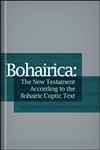
Bohairica: The New Testament According to the Bohairic Coptic Text
- Editor: J. Warren Wells
- Publisher: Logos Bible Software
- Publication Date: 2010
This Bohairic Coptic edition of the New Testament is based on the critical edition of Horner, and was prepared by J. Warren Wells. It is designed to be used alongside the resources of the Sahidic Coptic Collection, which were also prepared by Mr. Wells. Featuring uniformity in spelling, punctuation and other usage as is found in standard Greek editions, the Bohairic text found in this edition of the New Testament is intended to be coherent, consistent, and easy-to-use. Standardization and simplicity was the goal, allowing the text to be valuable to students and instructors as well as translators and textual critics.
Critical editions of the Greek New Testament (e.g. NA27, UBS4; also Metzger’s Textual Commentary) regularly cite Bohairic Coptic editions in the apparatus; such citation points to areas where the Bohairic Coptic either strengthens or challenges the form of the text. In such instances, Bohairica: The New Testament According to the Bohairic Text provides a source to confirm and evaluate such readings in their whole context.
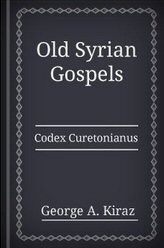
Old Syrian Gospels: Codex Curetonianus
Codex Curetonianus is one of two surviving Old Syriac manuscripts. It dates to the late fifth century. It was recovered in 1842 and contains most of the text of the synoptic gospels.
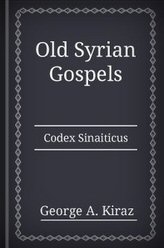
Old Syrian Gospels: Codex Sinaiticus
Codex Sinaiticus is one of two surviving Old Syriac manuscripts. It dates to the late fourth century. It was recovered in the 1890s and contains most of the text of the synoptic gospels.
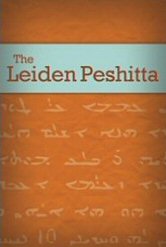
The Leiden Peshitta
The Syriac Peshitta of the Old and New Testament originated during the first centuries of the Christian era, and has been used ever since in the non-western churches of Syrian signature. Much like the Greek translations of the Old Testament, this ancient version is an important source for our knowledge of the textual traditions behind the biblical text. In contrast to the manuscripts of most Hebrew traditions, which date from the beginning of the Middle Ages, the extant Syriac manuscripts date from the fifth century. Some New Testament scholars argue for Aramaic as the original language of portions of the New Testament, and similarities between Aramaic and the Syriac of the Peshitta lead these scholars to encourage the study of the Peshitta.
This edition of the Old and New Testament was prepared at the Peshitta Institute in Leiden, and has become the standard Syriac edition. A. Ceriani’s photolithographic edition of 1876 serves as the basis for the Leiden Peshitta.

Septuaginta: Morphologically tagged edition, Alfred Rahlfs (LXX)
- Author: Alfred Rahlfs
- Publisher: Deutsche Bibelgesellschaft
- Publication Date: 1979
The Septuagint (LXX) is the Greek translation of the Hebrew Scriptures, which according to tradition was done by seventy Jewish scholars (hence the name) sometime in the 3rd century BC. It is the Bible which the Greek-speaking world read during the time of the apostles, to which Paul would have referred in his dealings with his churches. The Rahlf's edition is the most modern critical edition of this text. The morphology, prepared by the University of Pennsylvania, gives the user the ability to draw parsing and glossary information directly from the text, which is especially important because the Greek of the LXX is significantly different from that of the NT.

Brenton’s Septuagint: Greek Text
- Author: Lancelot Charles Lee Brenton
- Publisher: Samuel Bagster and Sons
- Publication Date: 1851
- Pages: 1,156
This volume contains the Greek text that Lancelot Charles Lee Brenton based his English translation from the Codex Vaticanus. One of the oldest and most important Greek manuscripts, it is named for its place of conservation—the Vatican library—where it has been kept since the fifteenth century.
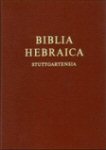
Biblia Hebraica Stuttgartensia (BHS)
- Publisher: German Bible Society
- Publication Date: 1990
The Biblia Hebraica Stuttgartensia is the standard Old Testament Hebrew text. Often referred to as the "Masoretic Text" or simply "BHS," this is the Hebrew text most widely used today. Containing both full diacritical annotation and vowel pointing, the BHS it is the text of choice in most seminaries, Bible colleges, and universities. The BHS serves as the underling text for most modern translations of the Old Testament. Please note that this edition only reflects the Hebrew text (consonants and vowels) and does not contain morphological information at all.
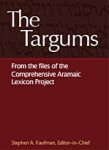
The Targums from the Files of the Comprehensive Aramaic Lexicon Project
- Targumim and Fragments included: 65
- Publisher: Hebrew Union College
- Publication Date: 2004–2005
Logos Bible Software is proud to be partnering with the team of the Comprehensive Aramaic Lexicon Project from the Hebrew Union College in Cincinnati, Ohio to release a Libronix Digital Library System edition of the Targumim. The Comprehensive Aramaic Lexicon Project (CAL), edited by Dr. Stephen A. Kaufman, is a new dictionary of ancient Aramaic covering all dialects of the language. The Logos edition of the Targums includes a comprehensive selection of Targums from the CAL files (listed below) as well as a Targum Lexicon generated as a subset of the larger CAL lexicon that includes every word in the Targum corpus.
Pay attention to the included Cairo Geniza Targumic Fragments for textual variants and alternative readings.
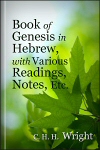
An astute overview of Genesis in the Hebrew translation with an emphasis on grammar, C. H. H. Wright’s practical Book of Genesis is packed with helpful references and notes to help beginning students and seasoned scholars of Hebrew get an enhanced understanding of Genesis in its original language.
Charles Henry Hamilton Wright (1836–1909) was born in Dublin an educated at Trinity College, Dublin. A prolific author and lecturer, Wright taught Hebrew in the Universities of Oxford, London, Manchester, and Wales.
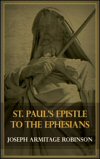
St. Paul’s Epistle to the Ephesians begins with a comprehensive introduction, which includes an outline of the book of Ephesians, along with a summary of Paul’s ministry and a brief history of the early Church. This volume is split into three resources: the Greek text compiled by Robinson himself; his own textual notes; and his translation and exposition of the text.
Joseph Armitage Robinson was born in 1858 in Somerset. He studied at Christ’s College at Cambridge, and was ordained in 1882. He served as Dean of Westminster Abbey from 1902–1911. Robinson died in 1933.
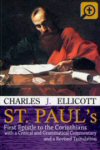
St. Paul’s First Epistle to the Corinthians: Greek Text
- Author: Charles J. Ellicott
- Publisher: Longmans, Green and Co.
- Publication Date: 1887
- Pages: 343
This volume contains only the Greek text assembled by Cambridge scholar and bishop C.J. Ellicott. For his verse-by-verse commentary and his English translation, check out Ellicott’s Commentaries on St. Paul’s Epistles (6 vols.).
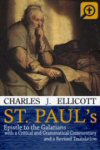
St. Paul’s Epistles to the Galatians: Greek Text
- Author: Charles J. Ellicott
- Publisher: Longman, Green, Longman, Roberts & Green
- Publication Date: 1863
- Pages: 168
This volume contains only the Greek text assembled by Cambridge scholar and bishop C.J. Ellicott. For his verse-by-verse commentary and his English translation, check out Ellicott’s Commentaries on St. Paul’s Epistles (6 vols.).
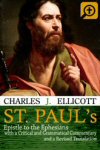
St. Paul’s Epistles to the Ephesians: Greek Text
- Author: Charles J. Ellicott
- Publisher: Longmans, Green, and Co.
- Publication Date: 1884
- Pages: 192
This volume contains only the Greek text assembled by Cambridge scholar and bishop C.J. Ellicott. For his verse-by-verse commentary and his English translation, check out Ellicott’s Commentaries on St. Paul’s Epistles (6 vols.).
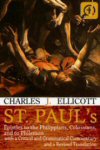
St. Paul’s Epistles to the Philippians, Colossians, and to Philemon: Greek Text
- Author: Charles John Ellicott
- Publisher: Oxford University Press
- Publication Date: 1865
- Pages: 278
This volume contains only the Greek text assembled by Cambridge scholar and bishop C.J. Ellicott. For his verse-by-verse commentary and his English translation, check out Ellicott’s Commentaries on St. Paul’s Epistles (6 vols.).
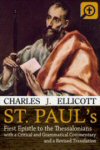
St. Paul’s Epistles to the Thessalonians: Greek Text
- Author: Charles J. Ellicott
- Publisher: W.F. Draper
- Publication Date: 1862
- Pages: 167
This volume contains only the Greek text assembled by Cambridge scholar and bishop C.J. Ellicott. For his verse-by-verse commentary and his English translation, check out Ellicott’s Commentaries on St. Paul’s Epistles (6 vols.).
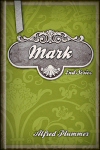
The Gospel according to St Mark: Greek Text
- Author: Alfred A. Plummer
- Publisher: Cambridge University Press
- Publication Date: 1914
Plummer’s Greek edition of the Gospel of Mark is his own compiled version of Mark from the second series of the Cambridge Greek Testament for Schools and Colleges. For the accompanying commentary as well as the Greek text of the first series of the Cambridge Greek Testament, check out the Cambridge Greek Testament for Schools and Colleges.
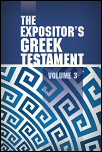
The Expositor’s Greek Testament, vol. 3: 2 Corinthians–Colossians: Greek Text
- Publisher: George H. Doran Company
- Pages: 547
Containing the Greek text of 2 Corinthians through Colossians, Expositor’s provides extensive notation on alternate versions of New Testament passages and links to manuscripts providing support and alternative words. This edition contains only the Greek text; for the English commentary by J.H. Bernard, Frederic Rendall, S.D.F. Salmond, H.A.A. Kennedy, and A.S. Peake, check out the full volume here.
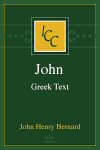
Greek Text from A Critical and Exegetical Commentary on the Gospel according to St. John, Volumes 1 & 2
- Author: J.H. Bernard
- Publisher: T&T Clark
Containing only the Greek text compiled by J.H. Bernard, this resource offers Bernard’s critical edition of the Gospel of John. For the full edition with commentary, you’ll want to see the International Critical Commentary: New Testament.
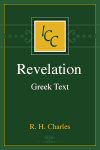
Greek Text from A Critical and Exegetical Commentary on the Revelation of St. John
- Author: R.H. Charles
- Publisher: T&T Clark
This resource contains only the Greek text of Revelation, giving us an early 20th century look at the reconstruction of Revelation using the sources R.H. Charles chose. See Revelation rebuilt from different ancient sources, and if his verse-by-verse commentary on the Greek text would interest you, pick it up in the International Critical Commentary: New Testament.
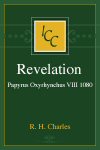
Papyrus Oxyrhynchus VIII 1080 from A Critical and Exegetical Commentary on the Revelation of St. John
- Author: R.H. Charles
- Publisher: T&T Clark
Compare other sources of the text of Revelation against Papyrus Oxyrhynchus VIII no. 1080, a fragment from the Oxyrhynchus Papyri collection discovered early in the 20th century. The fragment contains portions of Revelation chapters 3 through 4, and dates to around 350 AD. This resource contains only the Greek text of the fragment; for the rest of R.H. Charles’s commentary, check out the International Critical Commentary: New Testament.
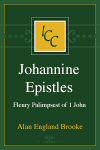
Fleury Palimpsest of 1 John from a Critical and Exegetical Commentary on the Johannine Epistles
- Author: A.E. Brooke
- Publisher: T&T Clark
Containing a brief Old Latin text of 1 John 1–3, this 6th-century manuscript comes from the Codex Floriacensis, used in A.E. Brooke’s commentary in the International Critical Commentary: New Testament series. This resource contains only the fragment; for the full English commentary, check out the International Critical Commentary product.
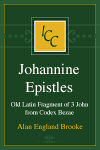
Old Latin Fragment of 3 John from Codex Bezae in a Critical and Exegetical Commentary on the Johannine Epistles
- Author: A.E. Brooke
- Publisher: T&T Clark
This resource contains a brief Old Latin text of 3 John from the Codex Bezae and was used in A.E. Brooke’s commentary in the International Critical Commentary: New Testament series. This resource contains only the fragment; for the full English commentary, check out the International Critical Commentary product.
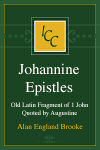
Old Latin Fragment of 1 John Quoted by Augustine from a Critical and Exegetical Commentary on the Johannine Epistles
- Author: A.E. Brooke
- Publisher: T&T Clark
Containing a brief Old Latin fragment from Augustine’s work, this resource was used in A.E. Brooke’s commentary in the International Critical Commentary: New Testament series. This resource contains only the fragment; for the full English commentary, check out the International Critical Commentary product.
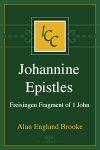
Freisingen Fragment of 1 John from a Critical and Exegetical Commentary on the Johannine Epistles
- Author: A.E. Brooke
- Publisher: T&T Clark
The Freisingen manuscripts date to the 10th century, though they are most likely copies of text that may have originated as far back as the 8th century. This resource contains only the Freisingen fragment of 1 John, and not any of the other Freisingen manuscripts. For A.E. Brooks’s commentary on the Johannine Epistles, be sure to check out the International Critical Commentary: New Testament series.
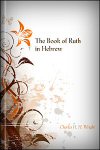
The Book of Ruth in Hebrew, with a Critically-Revised Text
- Author: Charles H. H. Wright
- Publisher: Williams and Norgate
- Publication Date: 1897
This volume contains only the Hebrew text of Ruth and alternate texts throughout this Old Testament narrative. The critical commentary on the text comes as part of Wright’s commentary, The Book of Ruth in Hebrew.
From the Introduction: "The editor had two principle objects in view in commencing the present work, namely, in the first place, to exhibit a specimen of a minute collation of Hebrew MSS, embracing not only the variations with respect to the consonants, but also those with respect to the Masoretic vowels and accents . . . And, in the second place, he desired to supply junior students with such assistance as might be needful in their early attempts at translating Hebrew, while at the same time the requirements of advanced scholars were steadily borne in mind."
Contents:
Mr. Wright's edition . . . is intended for those students who wish to be thoroughly grounded in the language. The commentary enters into the niceties of grammatical construction, and learners are also properly encouraged to familiarize themselves with the details of the Masoretic accentuation.
—The Westminster Review
Charles H. H. Wright (1836–1909) wrote commentaries on Daniel and Zechariah, as well as A Grammar of the Modern Irish Language.
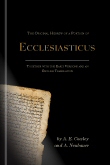
The Original Hebrew of a Portion of Ecclesiasticus: Greek Text
- Author: A. E. Cowley, Adolf Neubauer
- Publisher: Claredon Press
- Publication Date: 1897
This volume contains the Greek version of Ben Sira’s proverbs preserved in Talmudic and Rabbinic literature. For the English translation and the commentary and introduction, check out Classic Commentaries and Studies on the Biblical Apocrypha / Deuterocanon (42 vols.).

The Original Hebrew of a Portion of Ecclesiasticus: Syriac Text
- Author: A. E. Cowley, Adolf Neubauer
- Publisher: Claredon Press
- Publication Date: 1897
This volume contains the Syriac version of Ben Sira’s proverbs preserved in Talmudic and Rabbinic literature. For the English translation and the commentary and introduction, check out Classic Commentaries and Studies on the Biblical Apocrypha / Deuterocanon (42 vols.).

The Original Hebrew of a Portion of Ecclesiasticus: Hebrew Text
- Author: A. E. Cowley, Adolf Neubauer
- Publisher: Claredon Press
- Publication Date: 1897
This volume contains the Hebrew version of Ben Sira’s proverbs preserved in Talmudic and Rabbinic literature. For the English translation and the commentary and introduction, check out Classic Commentaries and Studies on the Biblical Apocrypha / Deuterocanon (42 vols.).
Claredon Press has done great service to students by this publication of the Hebrew original of the fragment of Ecclesiasticus lately discovered in the East.
—London Quarterly Review

The Original Hebrew of a Portion of Ecclesiasticus: Vetus Latina
- Author: A. E. Cowley, Adolf Neubauer
- Publisher: Claredon Press
- Publication Date: 1897
This volume contains the Old Latin version of Ben Sira’s proverbs preserved in Talmudic and Rabbinic literature. For the English translation and the commentary and introduction, check out Classic Commentaries and Studies on the Biblical Apocrypha / Deuterocanon.
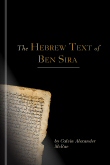
The Hebrew Text of Ben Sira: Hebrew Text
- Author: Calvin Alexander McRae
- Publisher: University of Toronto
- Publication Date: 1910
In The Hebrew Text of Ben Sira, Calvin Alexander McRae provides the Hebrew text of Ecclesiasticus 39:15 to 43:33. The commentary and English translation are provided along with this text in Classic Commentaries and Studies on the Apocrypha / Deuterocanon.
Calvin Alexander McRae was born in 1874 in the village of Erin, Ontario. While earning his MA, he studied Hebrew, Aramaic, Syriac, Arabic, and Assyrian, as well as these languages’ respective literatures. He also served as lecturer in Hebrew at the University of Trinity College, Toronto. The Hebrew Text of Ben Sira is the thesis he submitted to the University of Toronto for a Doctor of Philosophy.
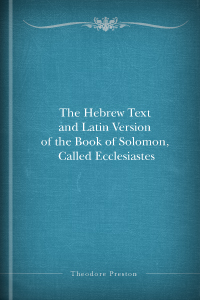
The Hebrew Text, and Latin Version, of the Book of Solomon, Called Ecclesiastes: Latin Text
- Author: Theodore Preston
- Publisher: John W. Parker
- Publication Date: 1845
This volume contains only the critical Latin text of Ecclesiastes—for Preston’s English commentary on Ecclesiastes, as well as his Hebrew and English editions, check out Classic Commentaries and Studies on Ecclesiastes.
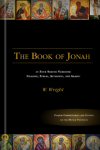
The Book of Jonah in Four Semitic Versions: Syriac Text
- Author: W. Wright
- Publisher: Williams and Norgate
- Publication Date: 1857
Wright’s Syriac text provides the whole book of Jonah in a critical format with alternate readings. For his commentary, as well as his Chaldee, Arabic, and Aethiopic versions, check out Classic Commentaries and Studies on the Minor Prophets.
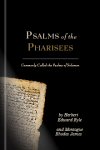
Psalms of the Pharisees, Commonly Called the Psalms of Solomon: Greek Text
- Authors: Herbert Edward Ryle and Montague Rhodes James
- Publisher: University Press
- Publication Date: 1891
The Greek text of the Psalms of Solomon from the Old Testament Apocrypha is compiled by various critical editions of the Greek Psalms of Solomon. The English translation and commentary are provided in separate volumes in Classic Commentaries and Studies on the Biblical Apocrypha / Deuterocanon.
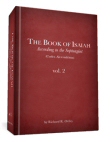
The Book of Isaiah according to the Septuagint (Codex Alexandrinus), vol. 2 (Greek Text)
- Author: Richard R. Ottley
- Publisher: University Press
- Publication Date: 1906
Volume two of The Book of Isaiah According to the Septuagint includes the entire Greek text of Isaiah from the Codex Alexandrinus, but the full commentary with notes and textual variants can be purchased as part of the Works of Richard R. Ottley.
Future commentators on Isaiah, as well as present preachers, will be wise to consult both volumes frequently.
—The Expository Times